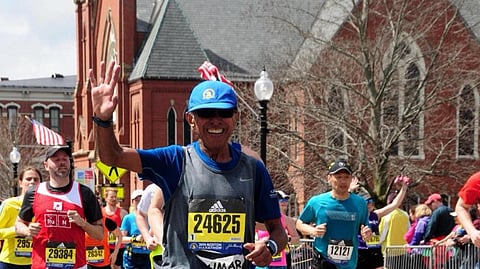

For Murali Gaddam, principal consultant at a French bank, and a runner of 10 years, running the Boston Marathon has been a longstanding dream after taking part in numerous races across India. “Completing the seven world marathon majors is a dream for many runners and this was the perfect opportunity for me to begin the journey – especially at such a historical running tradition,” he says.
For 45-year-old city-based IT professional and sportsman Bidappa KP, too, qualifying to run at the race is a personal triumph. “I used to play different sports, but I had high cholesterol and weighed around 70kg. I took it seriously in 2018 and had one goal: to qualify for the Boston Marathon and my father proud,” says Bidappa.
Apart from passion, qualifying for the Boston Marathon requires immense discipline and extensive training. “The qualifying time for my category in an AIMS-certified (Association of International Marathons and Distance Races, an association of organisers of long-distance road running races) marathon is three hours five minutes; I managed to run two hours 53 minutes in the New Delhi Marathon,” explains Gaddam, adding, “Boston is a tricky course, so while I’d love to chase a sub-three-hour finish. I also want to respect the course and give my best on the day.”
The most challenging part of the race is a hilly stretch called Newton Hills with Heartbreak Hill being particularly difficult to clear. “Heartbreak Hill at the 20-mile mark may be the most challenging one due to its half mile incline,” explains Bidappa.
Understandably, some participants are cautious about the physical strain on their health that the challenge poses. “I have always found Heartbreak Hill the most challenging. This year I am most concerned about the steep decline in the first km of the race due to my injury,” says Kumar Rao (76), who has run the marathon five times before, first at the age of 68.
Rao follows a strict training regimen to make sure he can keep going. “I find my training regimen has changed significantly from my first time. I devote more time to strength training along with five runs with at least one tempo and one long run,” says Rao, adding, “The Boston Marathon requires several hill workouts specifically tailored to its challenging course profile. I did 14 weeks of training, sometimes at Lalbagh, sometimes at home on a treadmill, getting to a weekly volume of 85 to 90km.”
Along with intense physical training, runners are prioritising their health, taking care to run safely. “They say a marathon begins after 30km, when the true test of fitness begins. The unique thing about Boston is that the first half is downhill. I plan to cruise, not accelerate. And when it flattens in the mid section, I’ll check my heart rate. If I’m not crossing my threshold, I will accelerate. I might walk some sections depending on my body. Every 40 minutes, I plan to take a running gel and I’m carrying salt pills,” explains Harsha Marigowda, a tech entrepreneur who will be running the Boston Marathon for the first time.
Apart from the challenge of it, repeat runners are looking forward to the energy of the event, as Rao explains, “The race weekend is full of interesting activities, with a chance to meet some elite runners, coaches and friends from world over. While the course is tough and requires focus, the crowd support throughout makes the time on the course fly by.”
(With inputs from Aakansha Munshi)